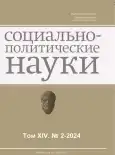The Teaching of Double Effect and Artificial Intelligence
- Authors: Goryachev A.Y.1, Smirnov S.V.1
-
Affiliations:
- Elabuga Institute of Kazan Federal University
- Issue: Vol 14, No 2 (2024)
- Pages: 211-215
- Section: Ontology and theory of cognition
- URL: https://journals.eco-vector.com/2223-0092/article/view/633881
- DOI: https://doi.org/10.33693/2223-0092-2024-14-2-211-215
- EDN: https://elibrary.ru/HTOIED
- ID: 633881
Cite item
Abstract
This paper explores the possibility of applying existing ethical principles to artificial intelligence learning algorithms. The processes controlled by artificial intelligence will have a significant impact on the lives of all people in the future. Decision-making without consideration of moral and ethical principles may lead to catastrophic consequences not only as direct damage, but also in the form of degradation of certain ethical norms in general. An attempt to directly transfer universal moral principles to the ethics of artificial intelligence may lead to insurmountable obstacles due to the nature of artificial intelligence.
Full Text
About the authors
Alexander Yu. Goryachev
Elabuga Institute of Kazan Federal University
Author for correspondence.
Email: aleksgmail@mail.ru
ORCID iD: 0009-0002-6306-2164
SPIN-code: 4452-9730
Postgraduate Student, Department of Philosophy and Sociology
Russian Federation, ElabugaSergey V. Smirnov
Elabuga Institute of Kazan Federal University
Email: sunstability@yandex.ru
SPIN-code: 3171-8134
Cand. Sci. (Philos.), Associate Professor; Head, Department of Philosophy and Sociology
Russian Federation, ElabugaReferences
- Vasiliev A.F. Metaethics: A review of the problematics. Philosophical Journal. 2018) Vol.11, no. 2, pp. 167-186.
- Goryacheva O.N. Constructing media reality with an agenda in mind. University Bulletin. 2021. No. 9. Pp. 151–155. (In Rus.) doi: 10.26425/1816-4277-2021-9-151-155.
- Lem S. Sum of technology. Moscow: AST, 2018. 736 p.
- Maksimov L.V. Ethics and morality: the correlation of concepts. Ethical Thought. 2003. No. 4. Pp. 14–22. (In Rus.)
- Skvortsov A.A. Philippa Foot: The problem of abortion and the doctrine of double effect. Philosophy and Society. 2018. No. 2 (87). Pp. 124–141. (In Rus.) doi: 10.30884/jfio/2018.02.09.
- Smirnov S.V. Critical analysis of ecological stereotypes. Biosphere Economy: Theory and Practice. 2022. No. 2 (43). Pp. 48–54. (In Rus.)
- Frolov K.G. Identification of actions as a factor of attributing moral responsibility. Ethical Thought. 2022. Vol. 22. No. 2. Pp. 34–47. (In Rus.) doi: 10.21146/2074-4870-2022-22-2-34-47. EDN: DHLXLO.
- Edmonds D. Would you kill a fat man? The task of the wagon: What is good and what is bad? 3rd edition, revised. Moscow: Gaidar Institute Publishing House, 2019.
- Belenguer L. AI bias: Exploring discriminatory algorithmic decision-making models and the application of possible machine-centric solutions adapted from the pharmaceutical industry. AI Ethics. 2022. No. 2. Pp. 771–787. doi: 10.1007/s43681-022-00138-8.
- Foot Ph. The problem of abortion and the doctrine of the double effect. Oxford Review. 1967. Vol. 5. Pр. 5–15.
Supplementary files








